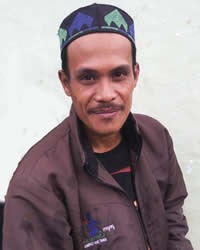Ulumanda in Indonesia

Photo Source:
Copyrighted © 2026
Anonymous All rights reserved. Used with permission |
Send Joshua Project a map of this people group.
|
| People Name: | Ulumanda |
| Country: | Indonesia |
| 10/40 Window: | Yes |
| Population: | 22,000 |
| World Population: | 22,000 |
| Primary Language: | Ulumanda' |
| Primary Religion: | Islam |
| Christian Adherents: | 0.02 % |
| Evangelicals: | 0.02 % |
| Scripture: | Translation Started |
| Ministry Resources: | No |
| Jesus Film: | No |
| Audio Recordings: | No |
| People Cluster: | Bugi-Makassar of Sulawesi |
| Affinity Bloc: | Malay Peoples |
| Progress Level: |
|
Introduction / History
The Ulumanda people live in the sub-district of Ulumanda in the regency of Majene in the province of West Sulawesi. This area is mountainous and rich in raw materials such as minerals, sand, rattan and ebony wood. The Ulumanda are closely related to the Bungku people who live in the Poso regency of the South Sulawesi province. It has been suggested that the Ulumanda are descendants of the Bungku people groups who migrated to West Sulawesi. Other designations for the Ulumanda are Ulumandak, Ulunda, Tubi Awosumakuyu, Botteng-Tappalang and Kayo. Their everyday language is the Ulumanda language, which is divided into three dialects: Sondoang, Tappalang and Botteng. The Ulumanda language is part of a larger linguistic grouping called the Pitu Ulunna Salu sub family, which also includes the Aralle-Tabaluhan, Bambam, Dakka and Pannei languages.
What Are Their Lives Like?
The Ulumanda's main occupation is the farming of rice (their staple crop), corn, potatoes and sago. Some Ulumanda gain their livelihood from gathering and marketing resin and rattan. Most Ulumanda living on the coast tend to work as fishermen. The soil in Ulumanda is less fertile than in other areas of West Sulawesi. In the past, there were two classes in the Ulumanda society: the upper class (tribal chiefs and nobility) and the common people. Today, the Ulumanda choose their village leader from the higher cast. In actuality, there are three leaders in a village: the leader chosen by the government, the cultural leader and the spiritual leader. In many cases, the Ulumanda villages are self-governing and self-policing. In the event of a crime or offense, payment is often demanded in the form of a water buffalo or some other valuable animal or possession. Sometimes offenders pay by transferring ownership of a plot of coconut-growing land. The payment often depends on the economic situation of the offender. In the past, marriages were arranged, but Ulumanda young people now choose for themselves. However, the man's payment of a bride price is often more than a year's wages and the cost of the wedding ceremony is very expensive (the woman's family does not pay anything). For this reason, many Ulumanda young people elope to nearby villages to be married. If they marry in their home village, the ceremony takes place in the woman's house.
What Are Their Beliefs?
At present, virtually all Ulumanda people are Muslims. However, traditional animistic beliefs are still strong in daily life. The Ulumanda society is a traditional system that is filled with prohibitions and taboos that are still rigorously followed by most of the people. The services of a dukun (shaman/healer/occultist) are often sought for many purposes, including healing sicknesses and exorcising evil spirits.
What Are Their Needs?
The Ulumanda people need assistance in the form of technical tools and better agricultural training, so their harvests can be more plentiful. In addition, the abundance of raw materials in the Ulumanda area needs professional management. Development and training of human resources is another need. Efforts are needed to empower the handicraft industry (especially ebony carvings) so these workers can receive fair market value for their products.
Prayer Points
Pray for the Ulumanda people to experience and embrace the glory of the Lord.
Pray for a spiritual hunger and an openness to truth that will give them a willingness to embrace the cross.
Pray for loving and dedicated workers to go to western Sulawesi.
Pray for Ulumanda disciples who will make more disciples.